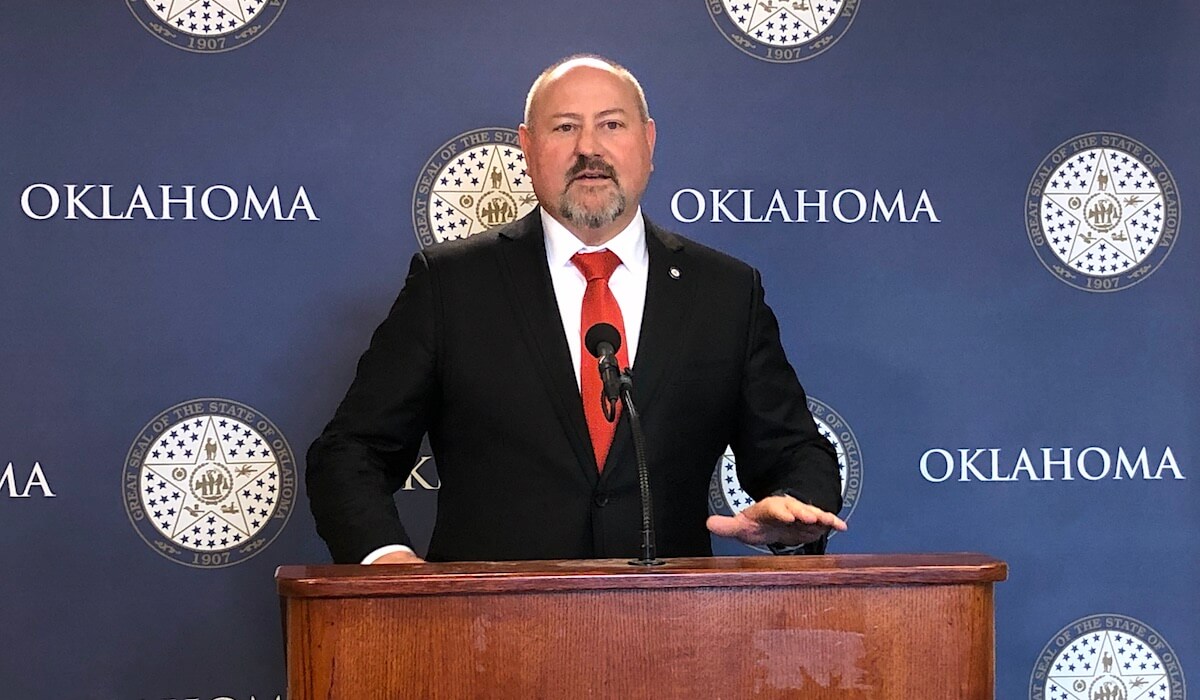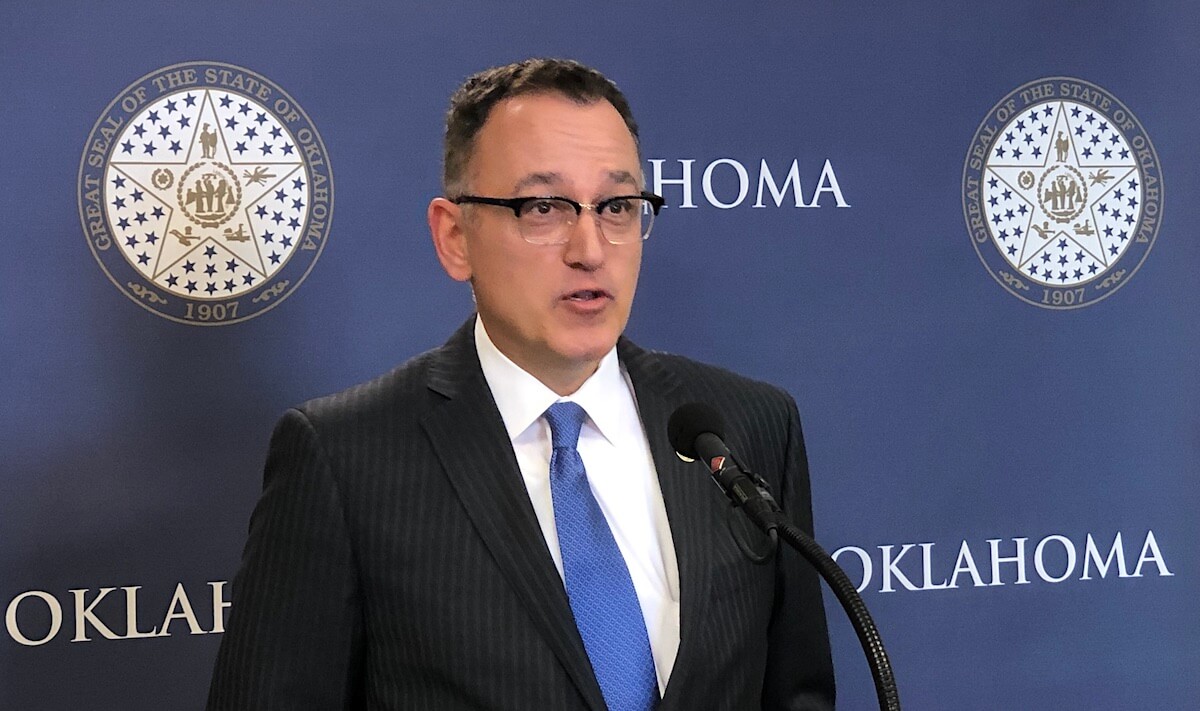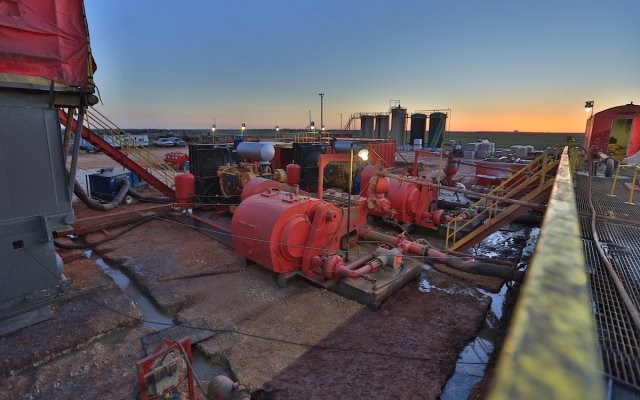
While Rep. Kevin Wallace tended cattle on his farm Sunday afternoon, his phone started to blow up: Energy markets were poised to take a nose dive in trading Monday as the effects of coronavirus pushed demand for oil down across the globe and a price war between Russia and OPEC further aggravated an already precarious situation.
The fear in those text messages was well founded. West Texas Intermediate Crude fell to levels not seen since 1991. At one point Monday, prices dipped to $31 per barrel. Stocks on the NYSE were down by more than 2,000 points Monday before trading briefly halted.
While Oklahoma’s economy is more diversified than it was during previous oil busts, about 25 percent is still dependent on robust energy prices. Continued reduction in demand from coronavirus fears and falling prices could have a profound impact on the state’s budget down the road.
As House Appropriations and Budget Committee chairman, Wallace is one of three primary people tasked with negotiating and building the state budget of Oklahoma. Wallace has seen the lows and the highs, moving from vice chairman to chairman during 2017’s state fiscal nightmare and enjoying the fruits of a historic 2018 tax package that allowed for more than $600 million in new education appropriations over the past two years. The largest chunk of that revenue increase came from gross production taxes on oil and gas wells.
When the OPEC news unfolded Sunday, Wallace (R-Wellston) was bombarded with text messages.
“It’s definitely not what you want to hear, especially when things were going fairly smoothly as far as a budgetary year where we knew what we had to work with,” Wallace said Monday at the Capitol. “Now it’s just one more wrinkle. We’ll get through it. It’s definitely not going to be a $1.3 billion shortfall like we’ve lived through before, so we will survive.”

Doomsday scenario for Oklahoma energy companies
The energy sector had already been in distress because of reduced demand for oil. The country’s largest airlines have grounded flights because of sluggish demand. Some international carriers like Lufthansa have parked more than 20 percent of their fleet in response to the slowdown.
And that was before Russia and OPEC entered a battle over production limits. OPEC had sought to reduce production to help boost oil prices, but Russia has declined to sign onto that agreement.
State Chamber of Oklahoma President Chad Warmington called the situation a perfect storm for the state’s energy sector.
“We’re competing in a global market where you’ve got significant oversupply issues, and with Russia and OPEC unwilling to restrict production, cheap oil is flooding a market that is already oversupplied,” Warmington said. “Layer that with what’s going on with coronavirus and all of the global economic crisis, it’s a bad one-two punch.”
Petroleum Alliance of Oklahoma chairman David Le Norman said the state’s producers have little choice but to weather the storm.
“It is too early to say what will happen with commodity prices in the longterm. However, we know the 350,000 hard-working, resilient people of Oklahoma’s oil and natural gas industry will do their best to support each other, weather the storm and continue to fuel our nation’s economy,” Le Norman said in a press release Monday. “Unfortunately, Oklahoma has been caught in the crossfire of these geopolitical issues beyond our control, exacerbating existing challenges and further threatening damage to our economy.”
It’s also possible some Oklahoma companies may not survive. Chesapeake Energy had already been in distress prior to this week’s downturn, with its stock price tumbling to just 15 cents in trading Monday. In 2008, that stock was at $62-per-share.
Asked if bankruptcies in the state’s energy sector were possible, Warmington said he could speak generally but not about any specific entity.
“I think that is in the cards,” Warmington said. “The modern oil and gas industry is not structured to be competitive in markets like this. The shale companies have been built on a growth model, and expanding footprint and growing production. To do that you have to borrow lots of money. Those companies aren’t able to get access to that lending right now. They can’t grow without that outside cash. Then, on top of that, the price right now lowers the value of their assets. It’s a double whammy.”
Treasurer: ‘We will have to monitor this’

West Texas Intermediate crude oil fell to $31-per-barrel in trading Monday. With next year’s state budget predicated on a roughly $54 price in oil, the situation could become problematic for state agencies and services.
Oklahoma State Treasurer Randy McDaniel said gross production tax downward trends over the last six months — coupled with Monday’s bloodbath — could deepen the problem for next year’s budget.
“If we’re expecting low $50’s per barrel and we trade down into the low $30’s today, and who knows what the future has to hold. Maybe we trend down into the $20s,” McDaniel said. “That would be of great concern. Clearly, we are counting on the numbers coming in, so we need the estimates to be on the money. We will have to monitor this very closely.”
Asked his message to state lawmakers, McDaniel cautioned against panic based on one day of trading.
“We’ve been thankful for two key things,” he said. “One is we have $1 billion in savings. The other is we can only spend 95 percent of what’s available. So when you put those two things together, we were prepared for some downturn, but we don’t know how long it will persist. We can’t make knee jerk reactions based on one day, but if it persists that will be of more concern.”
Legislators react to global oil market issues
Senate President Pro Tempore Greg Treat (R-OKC) said legislators will need to be aware of what’s happening globally with energy prices as next year’s budget is formulated.
“We have to live in a balanced budget, so we will be making decisions accordingly,” Treat said. “We’ve got to be good, prudent users of taxpayer dollars. We will not go into it blindly.”
Wallace concurred, diving deep into the state budget weeds he metaphorically eats for breakfast. Lawmakers are only allowed to appropriate 95 percent of each revenue estimate made for the next fiscal year. With less than four months remaining for FY 2020, Wallace said he believes the current fiscal year’s revenues will finish “very close” to the budgeted amount.
“As we move forward with the budget negotiations for FY 2021, we will be paying close attention through the rest of the session,” Wallace said. “As far as the numbers given to us (to appropriate) for the FY 2021 budget, those are set. It is true that we know that with the volatility in the market on the commodity price — especially on the global oil and gas economy — what is happening with OPEC, with Russia, with the Saudi, it does impact the state of Oklahoma.”
Wallace and Treat pointed out that fluctuation in oil and gas prices are reflected about 60 days later, meaning Monday’s crude price drop will affect future forecasts more than the next two months.
Still, anything affecting the Oklahoma’s largest industry can affect the state’s bottom line.
“For every job in the oil and gas industry, it counts as two jobs in the normal economy when economists are looking at Oklahoma’s employment and what impact [that industry] is going to have on tax revenue,” Treat said. “We’ve diversified our economy some — engineering and aerospace, especially. But we are still very, very tied to the oil and gas industry. We are proud of the jobs the oil and gas industry provides in Oklahoma, but they are entering a very tough phase, and we will see how long that lasts.”
Treat and Wallace each emphasized the value of recent state budgeting adjustments made to stabilize state services during trying times. Last legislative session, Gov. Kevin Stitt pushed for and received an additional $200 million in savings beyond what was mandated for the state’s Constitutional Reserve Fund.
“I think it was extremely important to put that $200 million into the oil and gas stabilization fund, and I’m glad I was part of trying to get that done,” Treat said.
During his 2020 State of the State speech, Stitt called for another $100 million to be dedicated to savings, something Wallace said he is not opposed to offhand.
The revenue estimates for next year previously showed more than $300 million available above last year’s budget, but Wallace said the number is slightly misleading.
“The budget that we are working on right now for FY 2021, everyone is very cautious because whatever we spend that $310 million cash on — if the economy just stays flat prior to this weekend — that’s one-time money,” Wallace said. “We need to be prepared (to use) that $310 million as a one-time source, or we’re going back to our savings account to prop up the FY 2022 budget.
“The FY 2022 budget is where things will become very interesting. That’s when things will be dipping into that $1.1 billion in savings — there is no doubt — if the economy stays flat.”
Stitt makes statement on global oil market drop
Late Monday afternoon, Stitt posted a video on his official Facebook page addressing strain in the global oil market. His remarks lasted 56 seconds:
I know that a lot of Oklahomans are struggling today with the drop in oil and gas prices and the drop in the stock market. It really affects all 4 million Oklahomans. We’re all tied together as one community. That’s why it was so important last year for us to save $200 million when we had a budget surplus. I’m proud to let you know that our state has over $1 billion in savings. It’s the largest savings account in state history, and it’s because of times like this when we are going to need it. When we make sure we never have to cut core services, we can continue to make sure that education is protected, that our state employees are protected. We will get through this, and as your governor, I will make sure we are fiscally responsible for this year’s budget cycle as well.
(Update: This story was updated at 4:45 p.m. Tuesday, March 10, to clarify remarks from Warmington.)





















